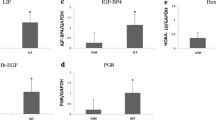Abstract
Purpose
The possibility of increasing the efficiency of an in vitro fertilization system (IVF) for Swiss OF1 mice was studied. The experimental protocol proposed analyzed the use of FSH as a superovulatory inducing hormone in comparison to traditional PMSG treatment. At the same time, the quality of IVF-derived embryos was evaluated both in vitro, with culture in CZB medium and fixation in advanced stages of development, and in vivo, by transfer to female recipients.
Results
Treatment with FSH induced a much higher ovulation number compared to PMSG (64.26 vs 33.85; P<0.01). With this gonadotropin, IVF provided a positive tendency to normal fecundation (67.76 vs 64.72; P<0.1) and a much lower index of abnormal division in embryos (10.57 vs 15.11; P<0.05). The viability of embryos obtained from donors treated with hormones was similar, although differences did exist regarding embryo origin: those obtained following natural fertilization showed a higher developmental capacity both in vitro (P<0.05) and in vivo (P<0.05).
Conclusions
We conclude that FSH is an improved superovulation alternative treatment in comparison to PMSG for IVF. It provides a higher number of embryos with the same in vitro and in vivo viability as those obtained from PMSG.
Similar content being viewed by others
References
Whittingham DG: Fertilization of mouse eggs in vitro. Nature 1968;220:592–593
Iwamatsu T, Chang MC: In vitro fertilization of mouse eggs in the presence of bovine follicular fluid. Nature 1969;224:919–921
Hoppe PC, Pitts S: Fertilization in vitro and development of mouse ova. Biol Reprod 1973;8:420–426
Hoppe PC: Genetic influences on mouse sperm capacitation in vivo and in vitro. Gamete Res 1980;3:343–349
Fowler R, Edwards RG: Induction of superovulation and pregnancy in mature mice by gonadotrophins. J Endocrinol 1957;15:374–384
Shirley B, Wortham JWE, Condon-Mahony M: Mating and embryo yield of mice injected with gonadotropins on specific days of the estrous cycle and in acyclic periods. Exp Biol 1986;46:83–88
Maudlin I, Fraser LR: The effect of PMSG dose on the incidence of chromosomal anomalies in mouse embryos fertilized in vitro. J Reprod Fertil 1977;50:275–280
Muñoz I, Rodriguez de Sadia C, Gutierrez A, Blánquez MJ, Pintado B: Comparison of superovulatory response of mature outbred mice treated with FSH or PMSG and developmental potential of embryos produced. Theriogenology 1994;41:907–914
Fraser LR, Drury LM: The relationship between sperm concentration and fertilization in vitro of embryo eggs. Biol Reprod 1975;13:513–518
Hogan B, Constantini F, Lacy E: Manipulating the Mouse Embryo. Cold Spring Harbor, NY, Cold Spring Harbor Laboratory, 1986
Fraser LR: Motility patterns in mouse spermatozoa before and after capacitation. J Exp Zool 1977;202:439–444
Dulbecco R, Vogt M: Plaque formation and isolation of pure lines with poliomyelitis viruses. J Exp Med 1954;99:167–182
Bronson RA, Mclaren A: Transfer to the mouse oviduct of eggs with and without the zona pellucida. J Reprod Fertil 1970;22:129–137
Chatot CL, Ziomek CA, Bavister BD, Lewis JL, Torres I: An improved culture medium supports development of random-bred 1-cell mouse embryos in vitro. J Reprod Fertil 1989;86:679–688
Tarkowsky AK: An air-drying method for chromosome preparations from mouse eggs. Cytogenetics 1966;5:394–400
Lehtonen E, Kandondi R: Rate of gonadotrophin-induced abnormalities in mouse ova is related to the site of hormone administration. J Reprod Fertil 1987;80:613–617
Sengoku K, Dukelow WR: Gonadotropin effects on chromosomal normality of hamster preimplantation embryos. Biol Reprod 1988;38:150–155
Fraser LR, Dandekar P: The relationship between zona digestion and cortical granule disappearance in rabbit eggs inseminated in vitro. Biol Reprod 1975;13:123–125
Abramczuk J, Solter D, Koprowski H: The beneficial effect of EDTA on development of mouse one-cell embryos in chemically defined medium. Dev Biol 1977;61:378–383
Lawitts JA, Biggers JD: Optimization of mouse embryo culture media using simplex methods. J Reprod Fertil 1991;91:543–556
Miyamoto H, Chang MC: Development of mouse eggs fertilized in vitro by epididymal spermatozoa. J Reprod Fertil 1972;30:135–137
Massip A, Van Der Zwalmen P, Puissant F, Camus M, Leroy F: Effects of in vitro fertilization, culture, freezing and transfer on the ability of mouse embryos to implant and survive. J Reprod Fertil 1984;71:199–204
Shalgi R: Developmental capacity of rat embryos produced by in vivo or in vitro fertilization. Gamete Res 1984;10:77–82
Author information
Authors and Affiliations
Rights and permissions
About this article
Cite this article
Muñoz, I., Del Niño Jesus, A., Josa, A. et al. Use of follicle-stimulating hormone (FSH) to increase the in vitro fertilization (IVF) efficiency of mice. J Assist Reprod Genet 12, 738–743 (1995). https://doi.org/10.1007/BF02212903
Received:
Accepted:
Issue Date:
DOI: https://doi.org/10.1007/BF02212903




